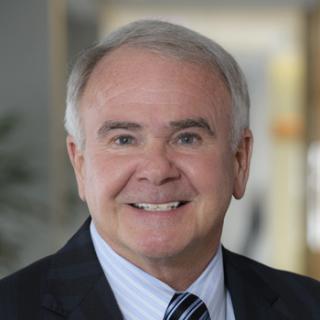AMA, Brigham and Women’s Hospital, Joint Commission team up on health equity effort
They are collaborating on an educational effort aimed at reducing disparities in patient care. Eight hospitals were selected for a year-long program.
Gerald Harmon, president of the American Medical Association

The American Medical Society is joining forces with Brigham and Women’s Hospital and the Joint Commission in an effort to help hospital systems incorporate health equity into all facets of patient care.
The groups are combining to launch a year-long mentoring effort to help health systems achieve equity in care and patient safety and to make progress toward racial justice.
Eight hospital systems were selected as the initial participants in the program, dubbed the Advancing Equity through Quality and Safety Peer Network.
AMA President Gerald E. Harmon said the COVID-19 pandemic illustrated the disparities in healthcare among minority groups and vulnerable communities.
Black and Hispanic Americans were more than twice as likely to be hospitalized due to COVID-19, and nearly twice as likely to die from the coronavirus, according to data from the U.S. Centers for Disease Control and Protection.
“For the past two years, the COVID-19 pandemic has further exposed systemic inequities in the quality and safety of the patient care experience – including gaps in interpretation services, telemedicine access, and crisis standards of care,” Harmon said in a statement.
President Biden’s administration has said it is viewing all federal efforts related to healthcare through a lens of health equity. The administration has directed more money to train doctors and nurses workers from underrepresented groups.
“We’re putting equity at the center of every decision we make,” U.S. Health and Human Services Secretary Xavier Becerra said in an address to the HIMSS 2020 Conference in March.
Healthcare leaders have said they are focused on addressing disparities in health outcomes among minority groups and vulnerable populations. Still, a recent survey found that about one in three healthcare executives (36%) have actually budgeted money for health equity efforts, while 25% of those leaders said they planned to do so.
A recent federal study found Black, Latino and Asian Americans were less likely to use video telehealth services than white patients.
- Related story: Using telehealth to improve equity and access
Black, Latinx and Asian patients are also more likely to contract hospital-acquired infections such as MRSA and C. diff, according to federal studies.
The program will employ a framework designed at Brigham and Women’s Hospital and the Institute for Healthcare Improvement, the groups said in a news release. It aimed to reduce inequities by using a focus on racism and equity to make gains in delivering top-notch care to all patients.
Sonali Desai, interim chief quality officer at Brigham, said the peer network represents the first phase of using the framework to measure equity.
“It’s so important to empower health care providers and health systems to dismantle structural racism and additional intersecting systems of oppression,” Desai said in the news release. “In addition, the Peer Network provides the ability to share experiences and learn from one another.”
These are the eight groups that will work with the network:
- Atlantic Medical Group/Atlantic Health
- Children’s Hospital of Philadelphia
- Dana-Farber Cancer Institute
- University of Iowa Hospitals & Clinics
- Ochsner Medical Center
- The University of Texas MD Anderson Cancer Center
- Vanderbilt University Medical Center
- University of Wisconsin Hospitals & Clinics
Joint Commission President and CEO Jonathan B. Perlin said he’s looking forward to seeing the health organizations develop viable solutions to make progress in health equity.
“Every patient deserves the right to safe, equitable healthcare,” Perlin said in a statement.
“The COVID-19 pandemic placed sharp focus on the unacceptable disparities in health outcomes, demonstrating significant work that must be done,” he said. “All healthcare organizations have a responsibility to identify and address the disparities that their unique patient populations face.”
Telehealth faces a looming deadline in Washington | Healthy Bottom Line podcast
February 12th 2025Once again, the clock is ticking on waivers for telemedicine and hospital-at-home programs. Kyle Zebley of the American Telemedicine Association talks about the push on Congress and the White House.